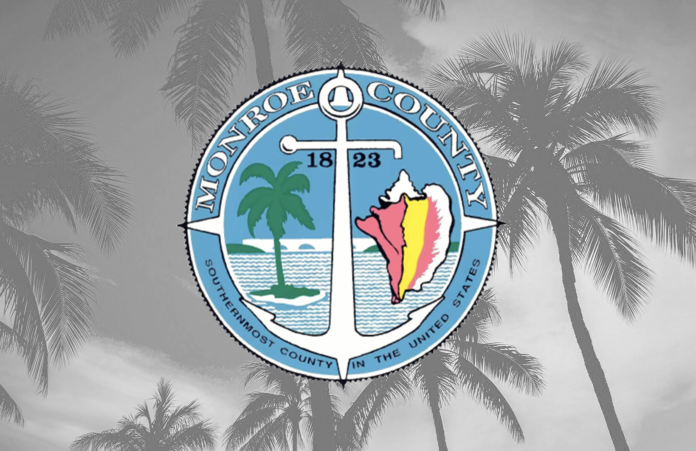Editor’s Note: The Board of County Commissioners voted Wednesday afternoon to approve a new emergency pay policy. See KeysWeekly.com for further coverage of the new policy.
Clarification: This story was updated at 11:45 a.m. on Thursday, May 21 to clarify that 61 Monroe County employees were furloughed without pay, but retained their benefits, after they received four weeks (two pay periods) of paid administrative leave at their normal pay rate.
In those same four weeks of paid leave at regular pay, another 480 or so county workers received extra compensation under the county’s emergency response pay policy. Those 61 employees are still unemployed, i.e., not receiving paychecks.
County officials last month rescinded the disaster-related pay policy that enabled county workers to accrue $1.5 million in overtime pay in the first four weeks of the pandemic.
Lawmakers on May 20 voted to “fix” the costly pay policy, although some employees still working on Hurricane Irma-related tasks continue to receive regular overtime for work beyond 40 hours a week.
The 2017 hurricane and current health crisis, according to payroll records, have cost the county and taxpayers a total of $5.3 million in overtime pay to workers, many of whom are salaried employees who wouldn’t be eligible for overtime under the regular pay policy.
In fact, the county has paid multiple employees some amount of Irma-related overtime in every pay period since September 2017.
As recently as January 2020, the county paid 16 employees a total of $16,598 for Irma-related overtime in one pay period. And in early March, just a week before the pandemic brought the Florida Keys’ economy to a halt, eight county workers were paid a total of $6,379 in Irma-related overtime, according to payroll documents. The highest amount of Irma-related pay understandably occurred immediately following the storm in September 2017, when the emergency pay totaled $1.5 million in a single pay period.
County finance director Tina Boan emphasized to the Board of County Commissioners at their May 20 meeting that the continuing Irma-related overtime has been necessary to ensure the proper paperwork filings for FEMA reimbursement of expenses.
“I have to have the man-hours to get the FEMA payments,” Boan said. “I feel completely justified in every hour of overtime incurred in order for us to be responsive to the state and federal requirements.”
Although accounting procedures in the clerk’s office label the emergency response pay as “Irma overtime” and “COVID overtime,” under the emergency response pay policy that was in place for Hurricane Irma and for four weeks of the COVID crisis, there is no requirement that an employee work more than 40 hours in a week to receive additional pay when the emergency policy is implemented and authorized by the county administrator. The administrator also has the authority to end emergency pay policy when an emergency is determined to be over, county spokeswoman Kristen Livengood told The Weekly.
The emergency response pay rate is equal to an employee’s usual hourly pay, plus time and a half, which amounts to “double time and a half,” as County Commissioner Craig Cates has repeatedly reminded the community and his fellow commissioners.
In normal circumstances, an hourly worker who makes $20 per hour would get time and a half, or $30 an hour, for every hour worked beyond 40 hours. But under the emergency response pay policy, the same worker earns the base pay of $20 per hour plus time and a half, for a total of $50 an hour for every hour worked on emergency-related tasks, even, Cates said, during a typical eight-hour workday..
The emergency response pay policy first came under fire in 2018, when Irma-related payments to county workers totaled more than $3 million. The same policy again drew criticism last month when the County Commission voted reluctantly to pay the $1.5 million in special COVID pay that had been accrued over four weeks, or two pay periods, in March and April.
In those four weeks, 480 or so employees earned a total of $1.5 million in extra compensation under the county’s emergency response pay, while another 61 county workers were placed on paid administrative leave and received their normal pay while doing no work.
After those four weeks, or two pay periods, the county canceled the extra emergency response pay for the 480 or so workers, and furloughed the 61 workers, who have received no pay since April, but have retained their benefits. Those 61 workers were urged to apply for unemployment and have yet to be reinstated.
State Attorney Dennis Ward told The Weekly on Tuesday that the county’s emergency pay policy is “on our radar.”
“I don’t know if it’s something a grand jury would investigate, but it is something my office is aware of and is hoping to see resolved,” Ward said.
Officials last month drafted a resolution that enabled workers to decline the extra COVID pay if they desired. County records show that 44 employees decided to decline the additional pay. The refusals total about $53,278 of the $1.5 million overtime total.
The highest overtime amount that was declined by an employee would have gone to the assistant county administrator, who accrued $10,572 in emergency pay in the first four weeks of the pandemic. The same employee received $56,354 in Irma-related emergency pay.
The county’s emergency management director in April told The Weekly she planned to decline the $12,665 accrued in special COVID pay, but records from the county clerk’s office do not show a waiver from that employee. The same worker also earned $13,344 in Irma-related emergency pay.
County administrators and elected commissioners have repeatedly said the Federal Emergency Management Administration (FEMA) and the state will reimburse the county for 87.5% of the emergency response overtime, but as of this week, FEMA has only reimbursed the county for $2.7 million of the $3.8 million for Irma-related work, leaving about $1 million in payroll reimbursement still outstanding.
In examining payroll spreadsheets for Irma and COVID overtime, The Weekly has learned that some employees have earned both Irma- and COVID-related emergency pay in the same pay periods.
For instance, for the two-week pay period ending April 11, 2020, records show that an executive administrator in the finance department was paid for 43 hours of Irma-related overtime totaling $2,057. In the same pay period, the same employee also was paid for 92.25 hours of COVID-related emergency pay at the double time and a half emergency pay rate. Records do not show that employee having waived the extra COVID pay.
“The person you are referring to puts together all the documentation requests required by the state to get FEMA reimbursement payments,” Livengood explained. “Without the documents, the state will not release payment. The county has been successful in receiving reimbursement payments because of its dedicated staff. Since March 28 through the end of April, the county has received 18 separate payments totaling more than $2.2 million.”
Similarly, for the same pay period ending April 11, the county’s senior budget director earned $1,056 for 11 hours of Irma-related emergency pay and $10,229 for 106 hours of COVID-related emergency pay.
Commissioners have repeatedly emphasized that the exorbitant pay policy is not the fault of county employees, but have agreed that the overtime payments are not financially sustainable.
County Administrator Roman Gastesi offered to resign last month over the emergency pay policy, but commissioners instead directed him to “fix” the situation.























